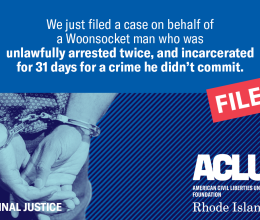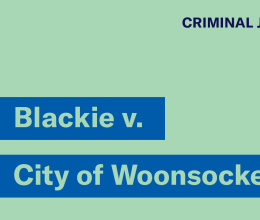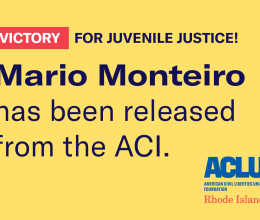UPDATE: Despite the strong opposition to the legislation, the Governor signed it into law. Read our statement here.
The ACLU of RI and twenty other organizations have sent a letter to Governor Gina Raimondo asking her to veto a law that would allow law enforcement access to confidential healthcare information without a warrant. Specifically, the law would grant some state and federal law enforcement agents access to the state’s Prescription Drug Monitoring Program (PDMP), which contains information on every prescription for a controlled substance dispensed by RI pharmacies, including cough syrup, common painkillers, and various other routinely prescribed medications.
Citing the opioid epidemic as a medical crisis, the letter expresses concern that the bill, in addition to being both ineffective and unnecessary, could actually undermine existing efforts to address the crisis. The letter states:
“We are concerned that these bills, if signed into law, may drive patients ‘underground’ and away from the care that they need and have the unintended effect of increasing the number of overdoses.”
“If police wanted to search the medicine cabinet in your home, they would need a warrant,” said Steven Brown, ACLU of RI executive director. “The fact that the medicine cabinet is stored electronically shouldn’t change that equation. In fact, it’s worse. Unlike the PDMP, your actual medicine cabinet contains only the medicines you are using now, not an entire history of your prescription use,” Brown continued.
In the veto request letter, the groups commend the Governor for her administration’s work to combat the opioid epidemic in Rhode Island as a medical issue, but note that this legislation “interjects law enforcement into that approach and invades the privacy and confidentiality of Rhode Islanders’ healthcare information.” The letter points out that that as result of other General Assembly actions and a gubernatorial task force working with prescribing professionals, the number of opioid prescriptions has dropped by almost 25% since 2013.
Among the many other organizations signing the letter urging a veto are the Rhode Island Medical Society, Mental Health Association of RI, the Opioid Treatment Association of RI, the Substance Use and Mental Health Leadership Council of RI, the RI Health Center Association, and the RI Dental Association. The legislation was among the most highly contested votes in this year’s General Assembly session.
Full text of the letter to the Governor is here.
A full list of signatories is here.
A full statement from Steven Brown, ACLU of RI executive director, is here.
Here are links to the House vote on the House bill and the Senate vote on the Senate bill.
ADDITIONAL STATEMENTS FROM SIGNATORIES TO THE VETO REQUEST
Sarah J. Fessler, M.D., Rhode Island Medical Society president:
“Our state’s PDMP is a medical decision making tool. Rhode Island’s opioid crisis is a medical one that until now has been - rather successfully - treated as such. Allowing law enforcement access to the private prescription histories contained in the PDMP threatens the sanctity of the doctor-patient relationship, and it could make patients less likely to seek and accept appropriate medical care. Our Department of Health already has the data and the authority to detect potential prescription drug diversion. This law provides a solution to a problem that does not exist - and threatens the medical privacy of all Rhode Islanders.”
J. Clement Cicilline, President of the Mental Health Association of Rhode Island:
“While law enforcement has an extremely important role to play in Rhode Island’s opioid crisis, patient privacy and access to treatment must remain foremost in our efforts and approach to deal with this major health problem. There should be no compromise when it comes to respecting and protecting the rights of individuals to a privileged relationship with their treatment providers. Otherwise, fewer and fewer people will get the help they so critically need.”
Steven Brown, ACLU of Rhode Island executive director:
“This bill strikes at the heart of doctor-patient confidentiality and undermines the public’s faith in our state Department of Health to be a protector of the deeply private information kept in its care. If police wanted to search the medicine cabinet in your home, they would need a warrant. The fact that the medicine cabinet is stored electronically shouldn’t change that equation. In fact, it’s worse. Unlike the PDMP, your actual medicine cabinet contains only the medicines you are using now, not an entire history of your prescription use. We urge the Governor to veto this dangerous bill.”







